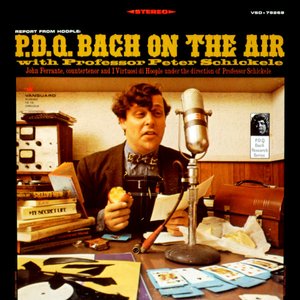Published on Dec 14, 2000
Classical Music is outright outstanding… It is very calm,
relaxing, and can also be a great mood-setter. Appreciating the
music of such Classical giants as Bach, Beethoven, and Tchaikovsky
are always a treat. So, as I was browsing through the Classical
section at the local record stores, I couldn’t help observing the
P.D.Q. Bach section. Two albums that were there were
On The Air, and
Classical WTWP Talkity-Talk Radio. Seeing that both these
albums were formatted as radio shows, and being a huge fan of radio
broadcasting, I couldn’t help but to grab these albums and listen
in. To my surprise, the gentleman at the register explained that
the P.D.Q. Bach albums were not like the common Classical albums. I
bought them anyway, not only because of the radio show format, but
now I was really curious.
P.D.Q. Bach is the creation (yet they say that there was such a
person as P.D.Q. Bach), of Professor Peter Schickele. His
observance of P.D.Q. Bach’s music is easily described as Classical
Music, in a comedic atmosphere.
First, let’s see how this radio show is presented. The
selections of this album were written as a radio show log, which
brought back memories for me, as I did the same for radio shows for
my Radio & TV course in High School. There are 6 tracks on this
album, where the first three consists of the Bright And Early Show,
and the remaining is the Dull And Late Show. The entire “broadcast”
is explained in the liner notes:
P.D.Q. BACH
ON THE AIR
From Radio Station WOOF at the University of
Southern North Dakota at Hoople
PROFESSOR PETER SCHICKELE
brings you the chamber music of P.D.Q. Bach
(1807-1742)?
with John Ferrante, countertenor
and I VIRTUOSI DI HOOPLE
(Peter Schickele, conductor)
on this week’s installment of
REPORT FROM HOOPLE
” The Bright And Early Show”: “The Signature Theme and Intro” is
an introduction as the DJ (Peter Schickele) introduces the show to
present the music of P.D.Q. Bach. But as he prepares to play the
song “Echo Sonata For Two Unfriendly Groups Of Instruments” he
experiences tape problems throughout the entire song. In fact, the
tape breaks on the air, yet the tape gets fixed, but tape problems
still persist. A Station Break is then heard, followed by a
Commercial – “Do You Suffer?”. This commercial is where we hear a
woman singing opera, asking “Do you suffer from pain?”
Beethoven’s Fifth Symphony is the focus of “New Horizons In
Music Appreciation.” Schickele explains that most classical music
pieces are long, and in most opera houses, the lights are turned
down low, where people could not read their programs while the
music is playing throughout the concert. P.D.Q. Bach’s solution is
heard, where as Beethoven’s 5th is playing, we hear a satire of two
announcers (Peter Schickele and Robert Dennis) explaining over the
music what is going on. This reminds me of Spike Jones’ “William
Tell Overture,” where the descriptions and accounts are that of a
sporting event. Very funny selection… Time, Weather, News
follows.
“Traumarai For Unaccompanied Piano” is the focus of the third
track, and it seems that as the song is playing, the microphones
are left open, as we can hear various crazy happenings going on.
“The Bright And Early Show” ends with a Station Break, Tag, and
Signature Theme (as we heard in the beginning of the show).
” The Dull And Late Show”: Fun and music, and P.D.Q. Bach…
We hear “Schleptet In E Flat Minor,” another classical piece,
and this one is more of a typical sounding classical piece, where
this composition could easily get radio airplay on “normal”
classical radio stations, such as Chicago’s WNIB. A Tag and Station
Break follows.
“What’s My Melodic Line?” is where listeners send in works of
composers from 1500-1750, and the musicians in the studio are
expected to play the compositions requested from the listeners. Two
requests are correctly identified. The last one was incorrectly
identified. The Time and News follows. The grand prize is where a
listener who has “stumped” the musicians, were to be entered, to
where the winner would win the complete works of Vivaldi, recorded
on 45 rpm records, which would be sent once a week, for the next 35
years.
“Fugue In C Minor” is a very comedical composition, where it
really sounds more Baroque/Calliope than Classical. “What’s
Happening In Home Economics” is where a minor “stab” at Beethoven’s
music is compared to Baroque/Calliope music. Suddenly, Peter
Schickele was forced to admit that he enjoys Beethoven’s music, as
if Beethoven’s ghost had taken over forced him, under Schickele’s
own free will (Beethoven’s Revenge). A commercial, and sign-off is
heard, ending the program, and this very memorable album.
P.D.Q. Bach is more of a comedic look at Classical Music. This
“radio broadcast” has the style of another comedian, Stan Freberg.
Throughout most of the spoken dialogue, sound effects such as dogs
barking, and dogs howling are heard – being the radio station call
letters – WOOF. As much as this is a look at Classical Music in a
much different way, there were die-hard Classical Music fans who
were offended that such a unique style of music was handled in a
comedic atmosphere. So, for the serious Classical Music fan,
depending on your sense of humor, this may or may not be an album
that would normally be recommended. Yet, for the humorist, and
maybe for people who do not especially like Classical Music, Peter
Schickele’s observance of P.D.Q. Bach’s music will bring laughter
and many chuckles in listening to something that Monty Python had
always said… “And now for something completely different…”
